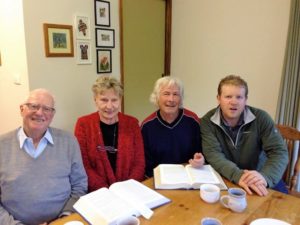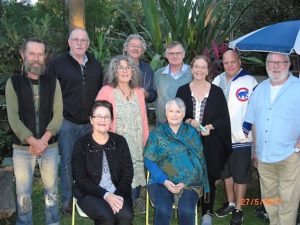Groups met around the world over the weekend of 27th May 2017 to study Papers 98 and 99: The Melchizedek Teachings in the Occident and The Social Problems of Religion. Following are some reflections from some who met:
Canberra Study Group
by William Wentworth
 Four members of the Canberra study group, William Wentworth (host), Jocelyn Goson, Verner Verass and Dylan Roberts, met on Sunday afternoon and read both papers. One of our members (Nigel Nunn) toils on Sundays and could not attend.
Four members of the Canberra study group, William Wentworth (host), Jocelyn Goson, Verner Verass and Dylan Roberts, met on Sunday afternoon and read both papers. One of our members (Nigel Nunn) toils on Sundays and could not attend.
We had excellent discussions at various points in the papers. We enjoyed being reminded that Christianity has such diverse roots, with so many of them arising from the work of Machiventa Melchizedek so many centuries earlier. One thing which stirred some discussion was the revelator’s assertion that Greek philosophy, even at its best, ignored self- preservation—salvation—for self-realisation and self- understanding. Some of us thought that the “virtues” of self-realisation and self-understanding are an integral part of salvation. Shakespeare puts the idea into the advice Polonius gives his son in Hamlet— “This above all,—to thine own self be true”—and we realised that the revelator was distinguishing between those concepts and salvation.
The other aspect of Paper 98 which drew comment was the extraordinary correspondence between Mithraic belief and the Christianity that most of us grew up with. So many of the concepts and practices of Mithraism seem to have been incorporated directly into Christianity, from notions of death and resurrection, of atonement, of judgement and redemption and many other concepts, as well as some notable rituals and forms of worship.
We noticed that Paul of Tarsus was given credit for much of this “theologic trading” (reminding us of the statement in Paper 195 that Paul and his successors were “keen theologic traders”). Paul well knew the receptivity to new truth among the Greeks where he launched the new religion — Christianity. Both Greek philosophy and Christianity have a focus on the individual in common.
The Hellenization of Christianity started in earnest on that eventful day when the Apostle Paul stood before the council of the Areopagus in Athens and told the Athenians about “the Unknown God.” There, under the shadow of the Acropolis, this Roman citizen proclaimed to these Greeks his version of the new religion which had taken origin in the Jewish land of Galilee. And there was something strangely alike in Greek philosophy and many of the teachings of Jesus. They had a common goal — both aimed at the emergence of the individual. The Greek, at social and political emergence; Jesus, at moral and spiritual emergence. The Greek taught intellectual liberalism leading to political freedom; Jesus taught spiritual liberalism leading to religious liberty. These two ideas put together constituted a new and mighty charter for human freedom; they presaged man’s social, political, and spiritual liberty.
Christianity came into existence and triumphed over all contending religions primarily because of two things:
- The Greek mind was willing to borrow new and good ideas even from the Jews.
- Paul and his successors were willing but shrewd and sagacious compromisers; they were keen theologic traders. [Paper 195:1.1–4, pages 2071:1–4] emphasis added
Paper 99 drew recognition from us of the difference between institutional religion and true religion. We took note of the statement that society is now very unsettled, and will remain so for a millennium or more. And it is only individual transformation by true religion which can elevate humanity to a stable and progressive civilisation. Such individuals may develop that spiritual insight which inspires genuine social progress. To this end men must live out their religion. Just thinking about it ultimately fails. As our non-present member loves to point out: “It is high time that man had a religious experience so personal and so sublime that it could be realised and expressed only by ‘feelings that lie too deep for words’”.
We discussed the necessity for religious groups to eschew political activity, while providing for religious individuals to participate in social reconstruction. There are obvious traps in this process which could easily entangle well-meaning idealists, and the only protection from such traps is the attempt by the individual to live by true religion as he perceives it.
As we look at how Christianity is now seriously challenged by rationally thinking men and women it is obvious that there are glaring philosophic inconsistencies which need to be reconciled. The crippling effect on spiritual progress that the demoralising edict— the “fall of man”—has had. This was brought into sharp focus for all of us at the Canberra Study Day.
The doctrine of the total depravity of man destroyed much of the potential of religion for effecting social repercussions of an uplifting nature and of inspirational value. Jesus sought to restore man’s dignity when he declared that all men are the children of God. [Paper 99:5.5, page 1091: 4]
The fact we are gregarious makes the formation of religious groups inevitable. The same spirit motivates every man and woman which makes possible, unity of spirit, however, since personality is unique—no two mortals being alike—it inevitably follows that no two human beings can similarly interpret the leadings and urges of the spirit of divinity which lives within their minds. A group of mortals can experience spiritual unity, but they can never attain philosophic uniformity. In the end it’s all a matter of faith.
Just as certainly as men share their religious beliefs, they create a religious group of some sort which eventually creates common goals. Someday religionists will get together and actually effect co-operation on the basis of unity of ideals and purposes rather than attempting to do so on the basis of psychological opinions and theological beliefs. Goals rather than creeds should unify religionists. Since true religion is a matter of personal spiritual experience, it is inevitable that each individual religionist must have his own and personal interpretation of the realization of that spiritual experience. Let the term “faith” stand for the individual’s relation to God rather than for the creedal formulation of what some group of mortals have been able to agree upon as a common religious attitude. “Have you faith? Then have it to yourself.”
That faith is concerned only with the grasp of ideal values is shown by the New Testament definition which declares that faith is the substance of things hoped for and the evidence of things not seen. [Paper 99:5.7–8, page 1091: 6–7] emphasis added
This gives just a glimpse of some of our intriguing discussions. It was a most enjoyable study.
Sydney Study Group Meeting in Newcastle
Rita Schaad
 People travelled to Newcastle this year to meet and study Papers 98 and 99. We enjoyed meeting two new readers and catching up with two others we haven’t seen in a long while.
People travelled to Newcastle this year to meet and study Papers 98 and 99. We enjoyed meeting two new readers and catching up with two others we haven’t seen in a long while.
While we waited for all to arrive, we enjoyed the fine warm autumn day chatting and wandering around the garden with cuppa in hand.
It’s always a great privilege to actually meet face-to-face on such occasions and to unite in prayer and then immerse ourselves in the fascinating topics presented in the book. Each one of us brings a unique and very personal perspective on the subjects and shares their inner convictions with the group. This is something we can’t do every day.
Reading about the Melchizedek Teachings transported us right back into that long ago time, where our imaginations can easily fly with the generous descriptions the writer of this paper—a Melchizedek himself—provides of the centuries-long survival of the new ‘One God’ concept; how it changed and adapted to Greek philosophic thought and found ways of expression in the Mystery cults of the Phrygians, Egyptians, and particularly in the Iranian cult of Mithras. So many of the Mithraic rituals have blended into the Christian religions and, of course, we were not surprises to find similarities with things some of us grew up with. I was especially touched to read about the ritual of dipping our fingers into holy water beginning in these times.
 In Paper 99: The Social Problems of Religion, the state of today’s affairs are being drawn out very clearly for us in order to understand the overall picture that is being presented to societies throughout the world. Our queries into ways of betterment and progress are answered over and over again.
In Paper 99: The Social Problems of Religion, the state of today’s affairs are being drawn out very clearly for us in order to understand the overall picture that is being presented to societies throughout the world. Our queries into ways of betterment and progress are answered over and over again.
Religion achieves its highest social ministry when it has least connection with the secular institutions of society. [Paper 99.0.1, page 1086.1]
And…
But religion should not be directly concerned either with the creation of new social orders or with the preservation of old ones….but it does not oppose the intelligent efforts of society to adapt its usages and adjust its institutions to new economic conditions and cultural requirements. [Paper 99.0.2, page 1086.2]
All in all, we had a most delightful day.
Melbourne Study Group
By Regina Williamson
 The Melbourne study group met and we were pleased to welcome Peter, a new reader. After a shared lunch at a restaurant we gathered at my home and studied Papers 98 and 99. We easily covered it all and everybody was very involved and excited. Peter was particularly excited and loved being a part of the group. Peter is one of those people who can honestly say that finding and reading/studying The Urantia Book has changed his life. Isn’t it great to hear this now and then?
The Melbourne study group met and we were pleased to welcome Peter, a new reader. After a shared lunch at a restaurant we gathered at my home and studied Papers 98 and 99. We easily covered it all and everybody was very involved and excited. Peter was particularly excited and loved being a part of the group. Peter is one of those people who can honestly say that finding and reading/studying The Urantia Book has changed his life. Isn’t it great to hear this now and then?
It was good to read the two Papers in succession; they belong together and clarify many concepts for us concerning many events and the history of our world.
Since the study day we have met again and quite a few of us are looking forward to coming to the conference in Hepburn Springs in September.

